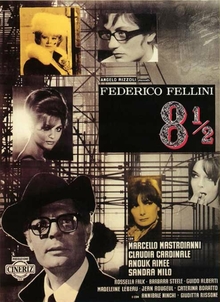Day and Night-Italian Style –Frederico Fellini’s 8 ½ (1963)-A Film Review
DVD Review
By Sam Lowell
8 ½ , starring Marcello Mastroianni, Anouk Aimee, Claudia Cardinale, written and directed by Frederico Fellini, 1963
I have admittedly been on a tear lately watching (or in some cases re-watching) some foreign films that were all the rage among college students and young professionals in the 1960s and 1970s. Recently in reviewing Francois Truffaut’s Day For Night, a film like the one under review, Frederico Fellini’s 8 ½, which both dealt with making films (or as here not making them) I noted the following that applies here as well:
“In the old days, the stretch between the early 1960s and early 1970s, around Harvard Square on the days, or rather nights, when you were not listening to folk music at one of the myriad coffeehouses around the Square or stretched out on Cambridge Common listening to some up and coming young rock and roll talent blast away you would in the interest of having a cheap date based on your low side funds wind up taking your consort to the Brattle Theater or some such place (sometimes local churches or the various houses at Harvard also ran films) to watch a film. Not usually one of the then current American Hollywood productions, a place which seemed to be in a trough in the movie-making cycle, but some film noir revival with entries like The Maltese Falcon or To Have Or Have Not or foreign, mainly French films, like those of Jean-Luc Godard or Francois Truffaut (at one time friends but because of differences about the film under review that friendship was busted up). At that time anything by a French director like this one by Truffaut, Day for Night, was an automatic go see, whether it was up to snuff or not.”
What went for the French directors applied as well to the Italian film-maker Fellini, especially after his early film La Dolce Vita blew us away with it cinematography and its meandering message about the “sweet life” that many of us were seeking then (although our forte was drugs, sex and rock and roll not among the high society types though). And so when we were older, old enough to go see Fellini films on our own in revivals, which we were not permitted to see earlier since the good Fathers at Sacred Heart warned us off such fare we would grab a date and go to the Brattle and check it out.
If Truffaut’s Day for Night was about the craft of film-making Fellini’s film is centered elsewhere with what one critic at the time called the travails of Guido’s director’s block and the facts of his life at that point which had helped him freeze up in trying to create something for the screen that could be produced and produced increasingly under time pressures (the film director is played by Marcello Mastroianni here). So we get, maybe more than we want to get, a full view of Guido’s life, his on again off again relationship with his estranged wife, with his mistress, recollections of childhood (a scene we all could appreciate of Guido as a youth dancing with a prostitute and then being punished by the good Fathers at his boarding school for such behavior-very familiar), a visit to a Cardinal, and all the attempts to appease Guido, or goad, him by bringing the film crew to his hotel to make the damn film. In the end something got produced, some sexual problems got resolved, and some of the greatest scenes and close-ups in film got produced. And Mastroianni was masterful in his role as Guido, was on a roll as an actor in those days. I never liked this one as much as my first Fellini film La Dolce Vita but it was close behind as a great film.

No comments:
Post a Comment